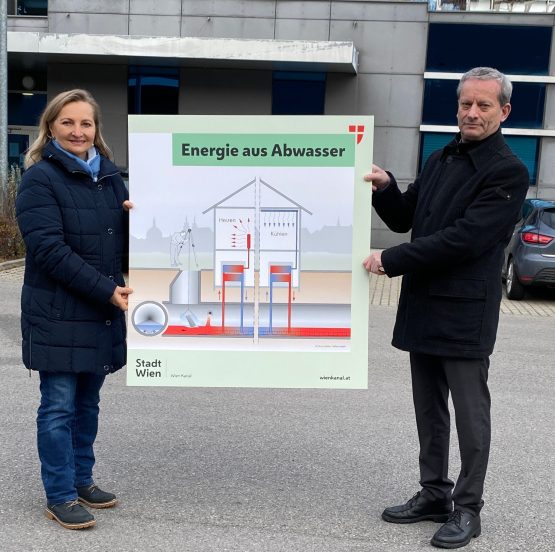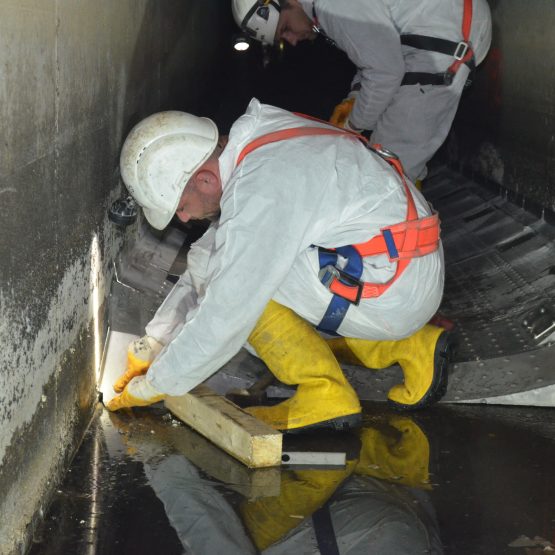City of Vienna relies on "energy from wastewater": Vienna Canal Center is heated and cooled completely renewably
On the way to a climate-friendly future, the entire spectrum of possibilities and technologies must be used - including resource-saving energy generation from wastewater. Because what hardly anyone knows is that there is enormous potential for energy supply in our sewer systems. The environmental technology specialist Rabmer is now providing such a forward-looking energy concept for the new Wien Kanal headquarters in Inzersdorf. In future, the almost 4,000 square meter building will be heated and cooled entirely with energy obtained from the sewer in Großmarktstraße.
Vienna/Altenberg, July 1, 2021 - The much-cited "green energy" encompasses more than its best-known representatives wind power, hydropower and photovoltaics. One energy source that is still underestimated is wastewater, which has enormous potential in terms of heat recovery and can be used to heat and cool buildings using innovative heat exchangers and heat pump systems. Fed by runoff from showers, dishwashers and washing machines as well as commercial and industrial operations, among other things, the temperature of wastewater in sewers is relatively high and constant all year round. In Vienna, for example, the average annual temperature is 16 degrees Celsius and very rarely falls below eleven degrees, even in the winter months. This means that the initial temperature is significantly higher than that of groundwater or geothermal energy, for example, and therefore the energy yield is also significantly higher.
One hundred percent heating and cooling from wastewater
In 2006, Wien Kanal activated the first system for generating energy from the public sewer network in Vienna. Modernized in 2017 with the support of Rabmer, it supplies both heating and cooling to the company's South Inzersdorf branch (1230 Vienna) with 140 employees on an area of 4,900 square meters. Wien Kanal's new headquarters for a further 100 employees is now being built at the same location on an area of 4,000 square meters, also using sewer wastewater as a renewable energy source.
"With the pilot plant, we achieve a saving of 65 percent of the heating energy and 100 percent of the cooling energy of our company building. With the new system for the Wien Kanal headquarters, we even cover 100 percent of our entire heating and cooling requirements with energy from wastewater," says Wien Kanal Director DI Andreas Ilmer.
In full operation, both systems deliver up to 700 kilowatts of heating and 630 kilowatts of cooling power. The same amount of energy that can supply over 200 households. The City of Vienna intends to make greater use of this enormous potential in the future. Wien Kanal will also make the use of wastewater energy available to external plant operators in future.
Heat exchangers and heat pumps tap into the resource of wastewater
The Upper Austrian company Rabmer provides the technology that harnesses the heat from wastewater as a source of energy. Channel-shaped heat exchangers are installed in the sewer and a heat pump is installed in the building to be heated. The two components are connected by a water circuit. The wastewater flowing over the heat exchanger heats this water circuit, which is then brought to the required temperature level by the heat pump. In winter, a building can be heated or hot water can be prepared in this way; in summer, the same technology is used to cool the building.
"This environmentally friendly method of energy generation is becoming increasingly important. Thanks to wastewater as a renewable energy source, our customers not only save on operating costs, they also improve their carbon footprint and thus make a significant contribution to climate protection. 'Energy from wastewater' has enormous potential. After all, up to 14 percent of buildings in Austria could be heated and cooled in an environmentally friendly way using this technology," says Ulrike Rabmer-Koller, Managing Director of the Rabmer Group.
Ulrike Rabmer-Koller (Managing Director Rabmer Group) and DI Andreas Ilmer (Vienna Canal Director)



